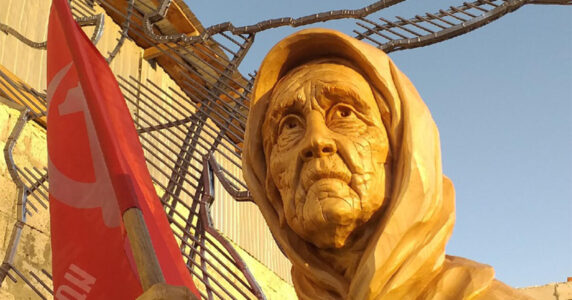Navigation and useful materials
“The great Russian state,” “the revival of the empire,” and the “reuniting of the peoples” are the go-to ideas for Russian propaganda whenever it seeks to reach the Russian people’s subconscious. As we are witnessing it now, the Kremlin is still desperate to justify Vladimir Putin’s imperialist aspirations by taking cover behind Russian culture and calling it “great.”
For centuries, Russian writers nurtured the Russians’ supremacy in their works. Many authors of “classic” Russian literature minted Ukrainophobic works, including Pushkin, Dostoevsky, and Brodsky. It’s no different in our time.
Notably, Russian culture failed to fulfill its main purpose, which was to save the Russians from degrading into barbarity in the 21st century. Once the people standing in the ranks of those who defended themselves from the Horde, the Russians have now turned into orcs. So-called “great Russian culture” failed to make a “great nation” out of an idealess crowd. That is why it should be subject to canceling.
What is cancel culture, or canceling
Cancel culture is an old concept gaining importance today. In the 5th century BC, the so-called “court of shards,” or ostracism, became popular in Ancient Athens. The procedure involved voting with clay shards to choose a person that was considered the biggest threat to the state. The citizen with the majority of votes was forced to leave Athens for 10 years. Because ostracism became an easy tool for dealing with political opponents, its use was banned.
In a broad sense, cancel culture is a concept that covers society’s resistance against intolerance that is not pronounced illegal by the law but is morally and ethically outrageous.
Now this concept is rapidly regaining its place in various areas of life, used everywhere from the A-list to politics. More and more often, the concept of cancel culture is also applied to Russian culture. Fair enough.
What is wrong with Russian culture
When it comes to culture itself, “canceling” it may be extremely hard. Alas, while Russia is still our eastern neighbor, its “culture” continues to exist with it. But it might be good to bring its culture “to mind.” If we observe the last century, for example, unlike in other countries, culture in Russia has not shown any manifestations of evolution. All countries can at one time or another support different political trends, but over time they will have to admit their mistakes and “repent.” It is because of this “recognition of mistakes” that states are able to start a new history.
For instance, post-WWII German culture, which allowed national socialism, “repented” too. Even great minds that were far from fascism, like Hegel, were chastised. This was a necessary step for the country to keep up with the times and define which parts of its cultural legacy the future generations would need to avoid the mistakes of the past. And as we can see, German culture passed this test for the sake of its new, powerful history.
All in all, this post-WWII wave of changes swept over the entire world but not Russia. On the contrary, Russia has despised the changes that have taken place in the world in the past 70 years. They include the demolition of monuments to Soviet leaders and “liberating” soldiers or giving new names to places instead of those associated with the Soviet past. That is why it is so difficult for Russia and Russian culture to adapt to the world today.
Russia doesn’t view its past as problematic. That’s why it can’t understand that although it was an empire for a long time in the past, its modern cultural model has hardly moved anywhere from that point. Unfortunately, the Russian people don’t realize that the imposition of their language alone caused cruel wars in Abkhazia, Transnistria, Chechnya, North Ossetia, Belarus, and finally in Crimea, Donbas, and all of Ukraine. But the failure to see the consequences may result in more casualties, with Russia’s “imperial ambitions” spreading further to the Baltics, Finland, and other parts of Europe.
What Russian writers did to Ukraine
Russia’s full-scale aggression against Ukraine would hardly have been possible if Russia hadn’t perceived itself as an empire. It viewed Kyiv as a “periphery” in relation to Moscow. Since Ukraine gained its independence, its reconstruction, successes, and sometimes even defeats have always ignited envy and irritation in Russia. Sadly, the Russians showed the dire consequences of “imperialism” in Bucha and Mariupol. One of the factors that made it all possible was “great Russian literature,” which for centuries kept hammering into the heads of Russians the idea that Ukrainians were “Little Russians.”
One need only think of the way the “great” Pushkin spoke about the November Uprising in Poland in 1830–31 or his accusations of cruelty and scorn for freedom (in Poltava). And as for the Russian Tsars who advocated for Serfdom and annexation of territories, Pushkin never batted an eye.
Quite close to Pushkin is the celebrated Aksakov, who preached monarchy as a form most suitable to the character of the Russian people. Alongside them are plenty of Russian writers of the second half of the 19th and the early 20th century, who spread anti-Western and anti-liberal sentiments.
In his “Jews in Russia” brochure (1883), Nikolai Leskov wrote: “The Little Russians have pleasant minds, but they are dreamy and prone to poetic contemplation and peace, and not mobile, slow, and unenterprising in character. In the best sense, it is expressed with subtle, piercing humor and stately propriety. In lively commercial trade, a Little Russian cannot present any strong resistance to the energetic nature of a Jew; and when it comes to crafts, the Little Russians are not at all skilled in them.”
The famous literary critic Belinsky wrote: “Since the Little Russian dialect was spoken mainly by peasants, simple and uneducated people, it was characterized by “simplicity,” which involuntarily limited its literature to “the lives of simple men.”
So it is obvious that the ideas of the “artificially created” state of Ukraine came to the Russian dictators’ minds for a reason. The groundwork for it had been laid for years — it had even influenced some groups of Ukrainians, too.
All in all, Russian culture is in desperate need of a “revaluation of all values.” And it doesn’t mean that this culture has to be destroyed. Not at all. For the first time in the century, it needs to be viewed critically by its admirers instead of translating blind faith in the tsar. But the term itself, “great Russian culture,” should get out of use. While Russia is waging its cruel war against Ukraine, this term is absurd.
If you have found a spelling error, please, notify us by selecting that text and pressing Ctrl+Enter.


